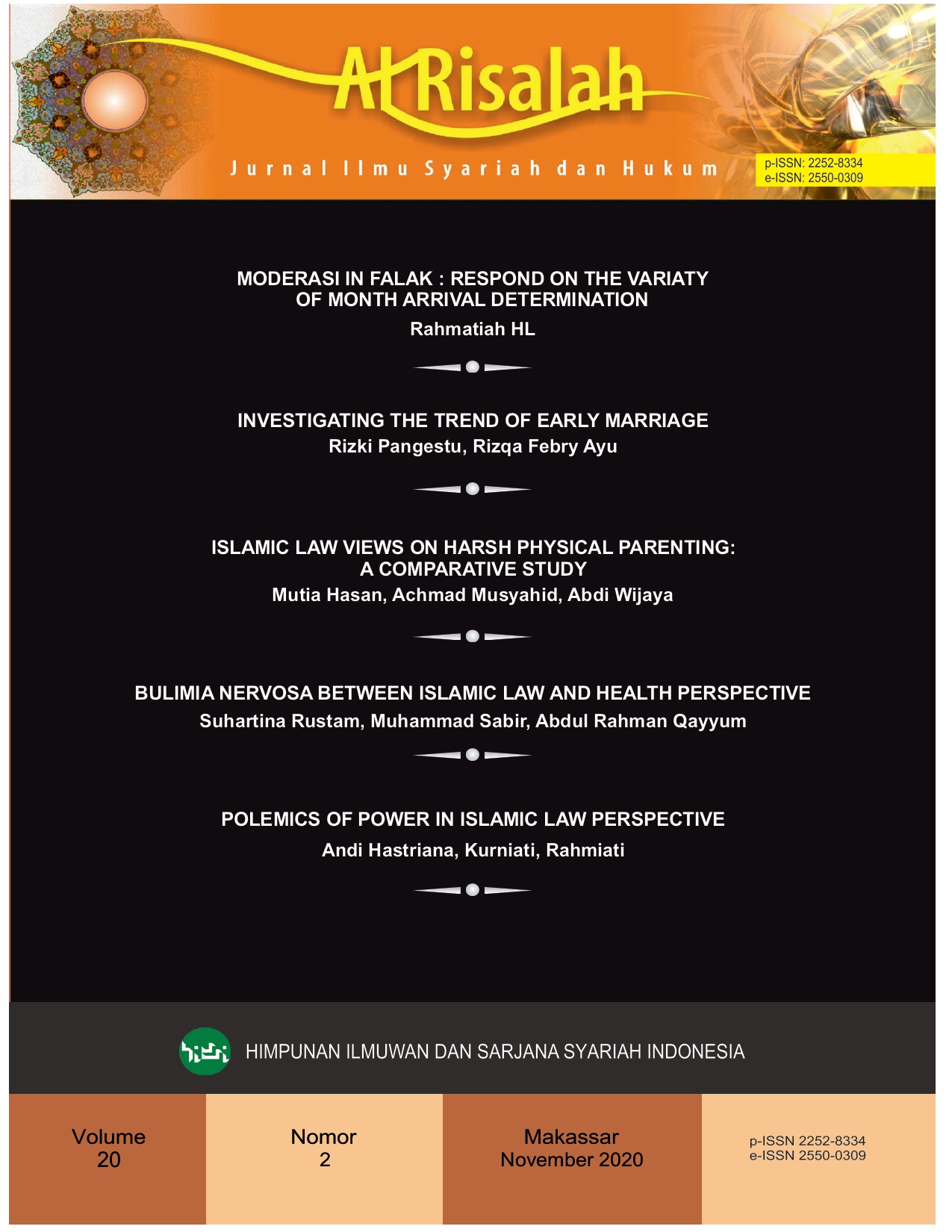MODERATION IN FALAK: Respond on the Variaty of Month Arrival Determination
Abstract
This study aims to elaborate the maslahah mursalah theory in responding to differences in the determination of the beginning of the Hijri month in religious moderation and examining the idea of wujū al - hilāl, rukyat al-hilāl and Imkān al-Rukyat theory in the analysis of religious moderation. The research method employes comparative study. A comparative study is comparing one idea to another and the results of one research with other tasks. The results showed that hisab and rukyah combination is possible to practice in Indonesia to create benefits based on maslahah mursalah. The maslahah mursalah approach is used to formulate laws based on maslahat considerations, a priority in maqasid al-sharia. The use of maslahah mursalah can be agreed upon. Besides, the Indonesian Muslim Ummah should be together in the implementation of worship for the sake of achieving a strong Islamic ukhuwah. Religious moderation is crucial to bridge the differences in determining the beginning of the Hijri month. The Falak science experts in charge of this issue are responsible for formulating the criteria for determining the beginning of the Hijri month, mainly related to fasting. 01 Ramadan, Eid on 01 Shawwal and 10 Zulhijjah, which can be accepted by those who use the criteria of rukyat al- hilāl and wujūd al-hilāl. In this way, efforts towards the unification of the Hijriyah calendar can be realized.References
Al-Quran dan Terjemahannya.
Agus, Purwanto. Sidang Isbat Sudah Tidak Relevan. Majalah Suara
Muhammadiyah, No.19/Th. Ke-96, 2011.
Djamaluddin T. Renungan Tahun Baru 1419 H, Pelajaran Hari Raya, Jakarta
Djamaluddin T. Astronomi Memberi Solusi Penyatuan Ummat. Jakarta; Lapan,
Faturrohman, Oman. Penentuan Awal Bulan Qamariyah Menurut
Muhammadiyah. Majelis Tarjih dan Tajdid PP Muhammadiyah: Yogyakarta,
Hambali, Slamet. Almanak Sepanjang Masa. Semarang; Program Pascasarjana
IAIN Walisongo.
Hakim, A. Bashori dan Yusuf Fuad Choirul. Hisab Rukyat dan Perbedaannya.
Departemen Agama RI: Jakarta, 2004.
_______, Majalah Islami Bulanan Khalifah, Redefinisi Hilal Sebuah
Keniscayaan. Edisi III Tahun I/17 Agustus – September 2008/ 14
Syakban – Ramadhan 1429.
Khalaf Syarifuddin, Amir. Masadir al-Tasyri al-Islami Fi ma La Nassa Fih,
Cet.III Kuwait: Dar al Qalam, 1972.
Majelis Tarjih dan Tajdid PP Muhammadiyah, Pedoman Hisab
Muhammadiyah.Cet. II; Yogyakarta; MTT PP Muhammadiyah, 2009
Mustofa, Agus. Jangan Asal Ikut-ikutan Hisab dan Rukyat. Surabaya: PADMA
Press.
______. Koran Tempo, Pemerintah Putuskan Idul Adha, Terbitan Tanggal 17
November, 2010.
PBNU No.311/A.11.03/1/1994. Pasal 1 a & b, Pedoman Operasional
Penyelenggaraan Ru’yat bil Fi’li.
PBNU, Pedoman Hisab dan Rukyat. Jakarta: Lajnah Falakiyah, 1994.
S. Zen, Chairul. Ensiklopedia Ilmu Falak dan Rumusan-Rumus Hisab Ilmu Falak.
Syafe‟i, Rahmat. Ilmu Ushul Fiqhi, Cet.III, Bandung :Pustaka Setia, 2007.
Syarifuddin, Amir. Ushul Fiqih Jilid II, Cet.I ; Jakarta: Logos Wacana Ilmu, 1999.
Syaban, al-Din Zaky. Usul al Fiqh al-Islami (al-Qahirah; Matbah Dar al-Ta‟lif)
Syah, Ahmad Faisal dan Yacob, Yahya Faisla, Jurnal Islam Futura, Metode
Penentuan Awal Ramadhan dan Hari Raya, Vol.16, No.1 Tahun 2016.
S. Zen Chairul. Ensiklopedi Ilmu Falak dan Rumus-Rumus Hisab Ilmu Falak.
http;sumut.kemenag.go.id/file/file/Rukyat/rimdl338174830.


